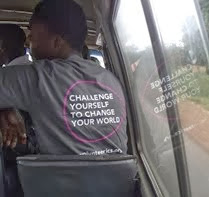By Chris Sutherland
I thought about a possible theme for a blog post on multiple
occasions over the last few weeks, but each time I drew a blank. So instead I
thought I’d just try and detail some of the crazy aspects of life in Lafia; a
place I would describe as the capital of relaxed chaos.
Food
I’ll start with the cuisine, never swallow a mouthful
without chewing, you never know if it’s going to contain a bone, piece of fat
or entire foot. If someone offers you soup, stew or porridge, don’t bother saying
you’ve had it before back home, those words have clearly been lost in
translation here. Asked my counterpart on day one what meat we were eating, he
said “cow, goat, sheep, pig or bush rat”. I didn’t bother asking again, I just
treat it like a game of meat roulette, never knowing where it’ll land.
Word of warning; if you buy a child a pack of biscuits in
the local store make sure he has no friends first. Otherwise prepare yourself
to be mobbed by the local children with requests of cupcakes and Bobo milk once
the word has spread about your generosity.
Wildlife
Saw a chicken cross the road in my first week here, wasn’t
as funny as I’d imagined and I’m still waiting for the punchline.
When the cockerel in your yard disappears one day don’t
assume you’re having it for dinner, it will likely lead to disappointment.
Money
If you like haggling you’ll love it here; if you don’t
you’ll pick it up very quickly. Be prepared for your first attempt without a
Nigerian to not go very smoothly though. On our first attempt we somehow
managed to bamboozle an Okada driver by saying ‘130 Naira, no 130 Naira’, only
for him to say ‘Ok, 120 Naira’. Learn from the masters though, it doesn’t
matter if you’re going two minutes down the road or the other side of the town,
a Nigerians opening bid will always be 60 Naira.
Television
Forget Hollyoaks, Eastenders and the other pillars of UK TV,
Nigerian ‘Who wants to be a Millionaire’ and ‘Super Story’ blow them out of the
water. I’d share the synopsis of ‘Super Story’ with you but I think that it
will take away from the enjoyment when you finally get to watch it for the
first time. Facial expressions and dramatic music can be found in abundance.
Entertainment
Ways to pass the time in Lafia without spending money
include: “who can touch the hot car roof the longest, who can do a plank the
longest and who can make the miserable shop owner smile first”. If you want to
spend money there’s “who can chug a fanta the quickest”.
Transport
Do you enjoy those simulators which make out like you are on
a wild car ride? I hope so, as get ready to spend a small portion of your time
driving with the bus tilted at a 45 degree angle , looking at the inner
workings and cogs of most vehicles and hearing a chorus of car horns wherever
you go
Things you can fit on an okada 3 grown men, one grown man
and five small children, a live goat, 10 metres of scaffolding, wheelbarrow and
a mattress.
All jokes aside if you end up in Lafia just try to embrace
it. The quirks I mentioned are what makes it so interesting to be here. The
work can be tough on a bad day, but on a good day it makes it all worthwhile.




































